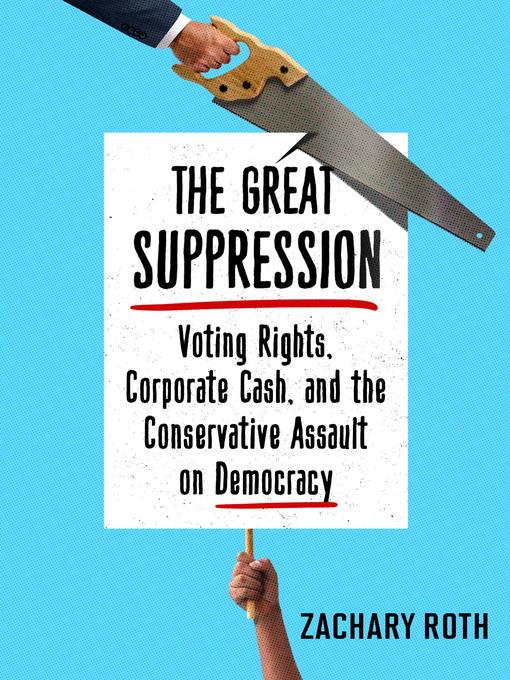
The Great Suppression
Voting Rights, Corporate Cash, and the Conservative Assault on Democracy
کتاب های مرتبط
- اطلاعات
- نقد و بررسی
- دیدگاه کاربران
نقد و بررسی

May 16, 2016
According to this grim investigation, when the Supreme Court struck down Section 5 of the Voting Rights Act in 2013, it bolstered ongoing right-wing attempts to limit democracy and voting rights. Roth, an MSNBC reporter, shows how states have restricted early voting and imposed voter ID laws in order to rig the game. As motivation, he pinpoints an underlying conservative “distrust of democracy,” abhorrence of “low-information voters,” and long-standing belief that corporations should, in fact, play a central role in politics. Roth reveals that, in another attempt to “roll back democracy,” there is a sincere movement to repeal the 17th Amendment, which allows for the direct election of senators. The underlying tension in most of these areas comes down to the question of whether to privilege the Constitution over “the will of the people.” Roth explains that once-per-decade redistricting will allow the GOP to dominate American electoral politics for years to come. His book should be required reading for understanding the ultimate goals of American conservatism. Agent: Sarah Burnes, Gernert Company.

Starred review from June 1, 2016
A blistering account of concerted Republican efforts to quiet the political voices of minorities, students, and the poor. Drawing on his work at MSNBC, where he is a national reporter, Roth debuts with a troubling overview of the many ways in which conservatives have worked to restrict voting, hamper campaign finance reform, and gerrymander Congress in the hope of undermining democracy. "Republican politicians and operatives, conservative lawyers, and grassroots activists," writes the author, have been engaged in a "guerrilla effort to maintain a hold on power and fight off a progressive agenda" since President Barack Obama's first election in 2008. They have done so out of a "profound skepticism about the consequences of democracy itself"--a serious belief that many citizens are uninformed, with little stake in their community, and that high-quality, civic-minded voters and corporations know what is best for society. Roth's succinct, well-written report examines disparate events and rulings of the past decade, arguing that conservative efforts to thwart the popular will have gone beyond partisan politics and are dismissive of the democratic process. Since 2006, more than 20 states have created laws making it harder to vote (requiring voter IDs, cutting early voting, etc.). In key decisions, especially the Citizens United case, the Supreme Court has eviscerated campaign finance laws, "ushering in a flood of political money that threatens to warp American democracy beyond recognition." At the local level, conservatives have blocked laws passed by progressive cities and counties that provide paid sick leave and improved wages for food service workers. The author also shows how judicial activism has used "constitutional minutiae" to limit the power of the people. Roth claims that distrust of universal suffrage has deep roots in American society, as evinced in the writings of individuals from historian Frances Parkman, who in 1878 said workmen and foreigners cared "nothing" for the public good, to conservative Samuel Huntington, who complained of an "excess of democracy" 100 years later. Solid reporting combined with engaging stories--even about campaign finance reform.
COPYRIGHT(2016) Kirkus Reviews, ALL RIGHTS RESERVED.

























دیدگاه کاربران